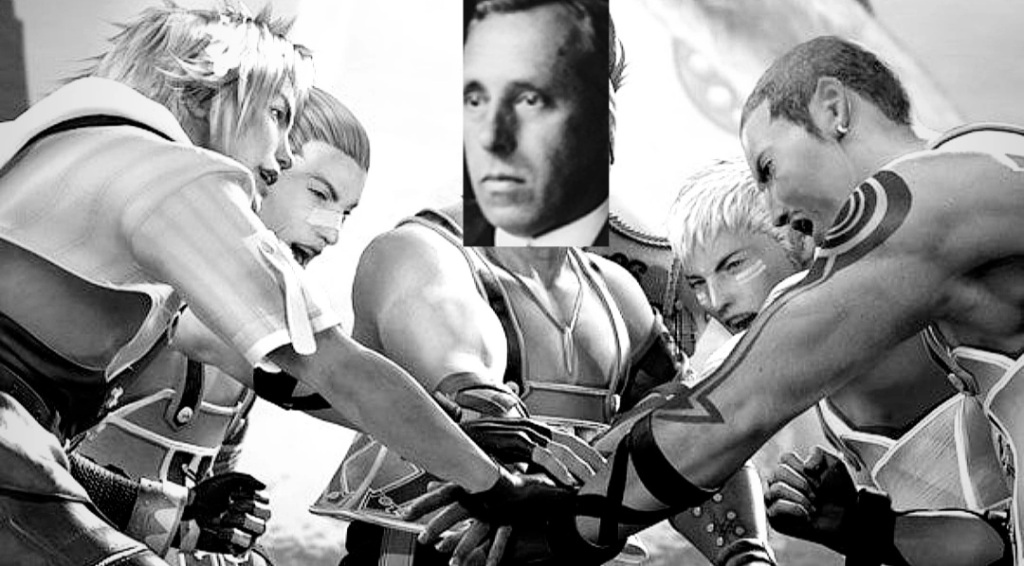In his seminal book Homo Ludens: A Study Of Play Element In Culture, Dutch writer and historian Johan Huizinga writes on the play element of culture: “We come across another, very positive feature of play: it creates order, is order. Into an imperfect world and into the con fusion of life it brings a temporary, a limited perfection.”
Johan Huizinga died nineteen years before Kazuhige Nojima was born, twenty-one before Yoshinori Kitase, fourty-two years before the first Final Fantasy. Bataille informs Jhonn Balance, Crowley informs Tibet, Huizanga informs Kitase.
A recent playthrough of 2001’s Final Fantasy X on a modded Vita was elucidatory after becoming familiar with Huizinga. Huizinga is most associated with Hideo Kojima – specifically Death Stranding – but his writing on the play element is naturally wide-reaching. Final Fantasy X, in so much of its innate fucking stupidity and earnestness, is undervalued in how it presents play – articulated in both its writing and the meta elements of its gameplay.
An ever-present, if cursory, element of FFX is the in-game sport of Blitzball. Ostensibly a combination of rugby, water-polo and trace bits of wrestling – taking place in the confines of a man-made sphere of water – Blitzball is introduced as the game begins, initially as a cutscene, mostly used to establish the opulence of Zanaarkand, before later being a fully playable side-activity.
Blitzball is played in spite of Sin – a creature that stalks the oceans of Spira, initally told to the player and understood by the populace as a literal monument to the sin of man, their hubris and use of machina. Though our understanding of Sin changes further into the playthrough, the population of Spira nonetheless risk death for Blitzball. The Crusaders of Yevon protect the main Blitzball hub of Luca, almost always in vain, because of how the play element both distracts from the ever-present threat of Sin and unites the disparate peoples of Spira – however briefly. Speaking to this, Huizinga says of play: “It adorns life, amplifies it and is to that extent a necessity both for the individual as a life function and for society by reason of the meaning it contains, its significance, its expressive value, its spiritual and social associations, in short, as a culture function.” It’s cross-cultural significance is such that the outcast race, the Al-Bhed, are invited to play in the Blitzball tournament. So crucial is the reach of the play element that even the perceived heretics are welcomed.
Blitzball is inextricably linked with Yevon and faith within the world of FFX, most immediately in that the Zanaarkand Blitzball gesture which protagonist Titus recognised as a cheering, good-luck symbol in his time is now, he discovers when reaching Besaid, a Yevon expression of prayer. In doing so the world of Spira blends faith and play, and is what Huizinga describes when discussing the Latin word Ludus – a term which covered all elements of play, including “children’s games, recreation, contests, liturgical and theatrical representations, and games of chance.” From its root, ludens highlights analogous relationships both divine and frivolous activity – drawing no linguistic distinction between church or pitch.
The world of Spira is interesting because Huizinga notes that play and culture, once inextricably intertwined in archaic times, is presented across cultures as distant and incompatible as time progressed. Spira is unique as a setting; in rejecting many forms of technology – much of Blitzballs’ logistical impossibilities are maintained through the more-reverent magic and pyreflies – as a form of penance, it incidentally maintains the link between play and culture.
FFX’s status as a landmark computer game title precedes any analysis of its contents and themes – a title that has a lot to say in regards to death, eros and, for our purposes, the play element. Homo Ludens is such a lastingly influential work because – despite the disposable reactionary elements of some portions of the texts – it articulates the latent importance of play in a time when the play element is more omnipresent – and more disposable – than ever before.
Thank you to obsolete hardware and my tech-savvy girlfriend.


Leave a comment